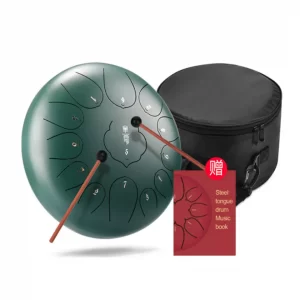
Tongue drums have become increasingly popular in the field of sound healing and therapy due to their soothing and melodious tones. These instruments, known for their ease of playability and gentle, resonant sounds, offer several benefits in therapeutic settings:
Harmonious Tones: Tongue drums produce soft, harmonic tones that are pleasing to the ear. These sounds can create a calming and meditative atmosphere, which is conducive to relaxation and stress relief. The frequencies and vibrations emitted by the drum can have a profound effect on the listener’s state of mind.
Ease of Use: One of the key advantages of tongue drums in therapy settings is their simplicity. Unlike some other musical instruments, they do not require extensive musical training to play. This makes them accessible to therapists and clients alike, regardless of their musical background.
Meditative and Mindfulness Practices: The repetitive and rhythmic nature of playing a tongue drum can aid in mindfulness practices. It helps focus the mind, drawing attention away from stressors and promoting a state of present-moment awareness. This aspect is particularly useful in meditative practices and stress reduction therapies.
Emotional Expression and Release: Playing a tongue drum can be a form of emotional expression. For individuals who find it challenging to articulate their feelings, creating music with a tongue drum can provide an alternative outlet for expressing emotions, aiding in emotional processing and release.
Physical Vibration: The physical vibrations produced by tongue drums can be felt by those playing or sitting close to the instrument. These vibrations can help in relaxation and can be particularly soothing for individuals with sensory processing disorders.
Therapeutic for Various Groups: Tongue drums are used in diverse therapeutic settings, including with children, the elderly, and individuals with mental health issues or developmental disorders. Their ease of play and gentle sound make them suitable for a wide range of people.
Enhances Cognitive Functions: Engaging with musical instruments like tongue drums can improve cognitive functions such as memory, attention, and spatial-temporal skills. It’s a stimulating activity that engages both the mind and the body.
Group Therapy and Community Building: In group therapy sessions, tongue drums can be used to enhance social interaction, communication, and a sense of community. Making music together can foster connections and provide a shared, harmonious experience.
Cultural and Spiritual Connection: Many tongue drums are inspired by traditional instruments from various cultures. They can be used not only for their sound but also to create a connection with cultural and spiritual practices.
Customizable Sounds: With various types and sizes of tongue drums available, therapists can choose an instrument that best suits their therapeutic approach and the needs of their clients.
In summary, tongue drums in sound healing and therapy offer a unique combination of musicality, simplicity, and therapeutic benefits. Their calming tones and vibrations are effective in promoting relaxation, emotional expression, mindfulness, and community building, making them a valuable tool in various therapeutic contexts.

Tongue drums offer a range of benefits, making them popular in various settings, from musical education to therapeutic and personal relaxation environments. Here are some of the key benefits:
Stress Reduction and Relaxation
The harmonious and soothing sounds produced by tongue drums can significantly reduce stress and anxiety levels. Playing or listening to the drum can induce a meditative state, helping to calm the mind and relax the body.
Enhances Mindfulness and Concentration
Engaging with a tongue drum requires focus and presence, which can enhance mindfulness. This concentration on the moment and the sounds being produced can improve overall mental focus and clarity.
Accessibility and Ease of Use
Tongue drums are incredibly user-friendly, requiring no prior musical knowledge or skill to play. This accessibility makes them ideal for people of all ages and abilities, including children and those without any musical background.

Emotional Expression
Playing a tongue drum can be a form of emotional release. For individuals who may struggle with verbal expression, creating rhythms and melodies on a tongue drum can provide an alternative avenue for expressing feelings.
Physical Coordination and Motor Skills
Playing a tongue drum involves hand-eye coordination and fine motor skills. This can be particularly beneficial for children’s development and for adults looking to maintain or improve their coordination.
Therapeutic Benefits for Various Groups
Tongue drums are used in music therapy sessions for a wide range of groups, including individuals with mental health issues, older adults, children with developmental disorders, and those undergoing rehabilitation.
Promotes Social Interaction and Teamwork
In group settings, playing tongue drums can encourage teamwork and social interaction. This is beneficial in educational settings, community groups, and therapeutic environments.

Cognitive Benefits
Learning to play and engage with musical instruments has been linked to improved memory, attention, and other cognitive skills.
Cultural Appreciation
Many tongue drums are influenced by traditional instruments from various cultures. Playing them can foster an appreciation for different musical styles and cultural histories.
Personal Satisfaction and Achievement
Learning to play a tongue drum and creating music can provide a sense of personal achievement and satisfaction. It can be a joyful, creative outlet for many people.
Overall, tongue drums are valued for their therapeutic qualities, ease of use, and their ability to provide a peaceful and harmonious experience. Whether used in educational, therapeutic, or personal settings, they offer a unique and accessible way to enjoy the benefits of engaging with music.

